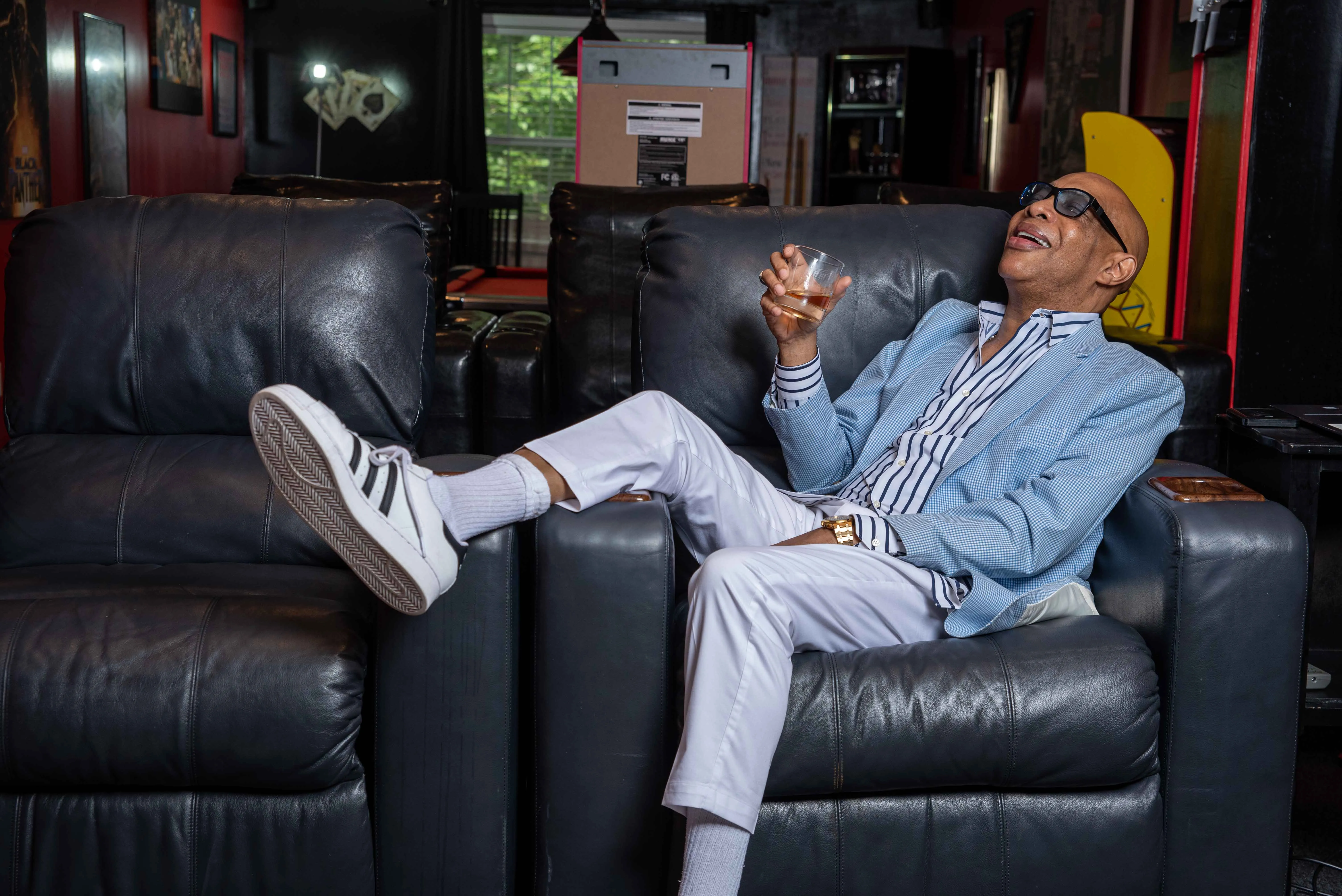ALONZO BROWN’S JOURNEY FROM HARLEM TO HOLLYWOOD, STEEPED IN LIVING, LOVING AND LEVERAGING BLACK CULTURE, CREATIVITY AND EXCELLENCE
By Norma Stanley
According to Alonzo Brown, founder of Brown Communications, Alonzo Films and Emmy-and Image Award winning creator and executive producer of the successful and long-running “Judge Mathis” television show, when it comes business, there are only three conversations…“A conversation for relationships, a conversation for possibilities and a conversation for action” “Anything else is a waste of time,” Brown says, who has quietly built a successful career in entertainment as a music, film and television executive over the past 30 years, and whose career spans the entire media landscape from music artist, record executive, film and television, director and writer. An original member of the growing popularity and demand for rap music, Brown began his successful professional journey, as part of the old school rap duo Dr. Jekyll and Mr. Hyde with his childhood friend from Harlem, NY who later became his business partner, the late music mogul, Andre Harrell. Together they formed Uptown Records in New York, which launched the careers of many legendary R&B and rap recording artists, including Mary J. Blige, Heavy D, Al B Sure, etc., serving as the foundation for a series of successes in the entertainment industry. This was a success with which he says he actually felt quite comfortable as a teenager at the beginning of his rap career with Harrell, following a stint working as an intern on the American Stock Exchange in his last year of high school. “Andre was an account executive at WINS 1010 Radio and always wore a bowtie and I wore a suit while working at the stock exchange as in intern, so Dr. Jekyll and Mr. Hyde were known as the “Champagne of Rap” because we wore suits when we performed, which set us apart from some of the other popular rap artists out at the time, like Sugar Hill Gang, Melle Mell, Afrika Bambaata, etc.,” says Brown.
According to Brown, both he and Andre were also infatuated with the classic Harlem lifestyle, which Brown says was exemplified and modeled by his own parents. “My father, a chauffeur for wealthy white people and my mother who began as a maid before going into education, were always fashionable, foxy, cool and confident and played music all the time, which contributed to my love of music,” shared Brown, “Before I knew it, I found myself writing poems, then writing music around 13 or 14 years-old,” he said. Growing up in the projects of Spanish Harlem on 110 th Street and Lexington Avenue, Brown says he would look out his fourth-flloor window towards 96 th Street, which was considered “the line,” the last stop on the subway, where all the white people got off the train, and wondered what was different about where those people lived.
“My mother was now a single mother working as a guidance counselor, who not only instilled in us lots of love, but an emphasis on education with a goal of keeping us off the streets. She also instilled a confidence in us, always telling us we could be anything we decided to be,” said Brown. “Mom would take us downtown all the time to the movies and museums and I knew just because I lived in Harlem, didn’t mean I couldn’t some day live downtown, because I knew and believed I belonged everywhere and anywhere I wanted to and Andre had the same belief, so we began collaborating,” he said.
Jekyll and Hyde took off instantly and at about 17 years-old, we would leave our office jobs at the end of the day, and traveling to other cities like Miami, playing major venues like Apollo, Wembley Arena, Madison Square Garden, touring with artists like Grand Master Flash, Kurtis Blow, Melle Mell, Con Funk Shun, etc. and we were making like $1,500 a week,” said Brown. “we discovered other places and other people. It opened the door to a brand-new life and brand new opportunities,” Brown said.
Those new opportunities included founding Uptown Records with Harrell and watching and learning from what artists/producers like Russell Simmons were doing, including securing the deal with Def Jam Records and Columbia.
“This was our first education in understanding the music business. We were watching and learning from people like Russell and seeing small record companies merging with larger record companies, so Uptown formed a partnership with MCA Universal and the things skyrocketed even more from there,” said Brown.
Brown says that preparing themselves and others for success was an important part of how they learned to run their growing music enterprise.
“At Uptown Records, we groomed and nurtured more executives than anybody. We had nine hits on air at one time with R&B and Hip Hop Artists like Al B Sure with his “Night and Day, single, which was a tidal wave hit and Queen of Hip Hop, Mary J. Blige, Jodeci, Heavy D with their hits,” Brown continued. “We never hired executives from other labels, we hired from the streets and the clubs. We also generated a culture of hard work balanced with fun, becoming known both for creating hit making artists and having parties that everyone who was anyone, wanted to attend,” he said.


For two young Black men who grew up in Spanish Harlem, learning the nuances of entrepreneurship and developing their craft, learning the recording industry and experiencing life at a new and different level, became the reality to the visions they both had for their future.
“We both felt comfortable with success, and there was a healthy competition between the two of us, but we were always looking for what we could do better and what we could do next and how we could make impact,” shared Brown. “Also Uptown gave us the freedom to be ourselves and the opportunity to come to business and life on our own terms--with excellence,” he continued. “We were serious about our work and we were serious about our play, but we were also helping to open doors and offer exposure to a new way of life for others who grew up in the inner city like we did! For example, we were among the first blacks back then hanging out in the Hamptons, going to Cipriani’s, etc.”
As a result of their success with the Uptown record label, Brown says they were able to really explore and appreciate their freedom as entrepreneurs and that it wasn’t long before Hollywood began calling. This opened the door for Brown to move to Hollywood to start testing the waters of working as a film and television show concept creator, screenwriter and director, etc.
“First you had Fresh Prince, New Jack City, Krush Groove, Def Comedy Jam and because MCA Records was owned by Universal, they started to look at film and TV deals and wanted to tap into the talent found at Uptown Records,” Brown shared. “I was chosen to go to Los Angeles to run Uptown Entertainment, research the possibilities for film and TV projects and stretch my creativity, while Andre continued to run Uptown Records, before moving on to Motown.
In Hollywood, Brown pursued meetings with movers and shakers in film and television. It wasn’t long before the opportunity to create, write and direct culturally relevant film and television projects like “Honey” starring Jessica Alba and the animated TV project, “My Cousin Skeeter,’ came about. He also co-created the concept for the highly successful Fox television show “New York Undercover,” about two cool, handsome young Black and Puerto Rican police officers (Malik Yoba and Michael DiLorenzo) solving crimes on the streets of New York City. These were just a few of his successes outside of music.
“Success comes where there is a convergence of moments and timing,” Brown said. “I’ve always been good at looking at the intersectionality of culture and business, studying what people aren’t doing and finding a way to create something new,” shared Brown. “Hollywood was beginning to see the value of the Black dollar and Hip Hop was hot! As a result, I was able to leverage my creativity and story-telling skills to create projects like “Honey” and “New York Undercover,” which was the Hip Hop version of Miami Vice,” he said.
Today, Brown is the owner of Brown Communications and Alonzo Films Enterprises. Brown continues to executive produce the award-winning Judge Mathis Show and producing fundraising videos for charitable organizations. In addition, continuing to tell stories of the Black culture via audio, film and books are a major part of what he is currently working on. This includes tapping into the $4 billion audio book industry and creating the first Black audio book company targeting women of color. His first project is a 12-episode series called “The Atlanta Diaries,” which shares the love, life and happiness of reality show star, Cynthia Bailey and two of her friends. He is also writing a film called, “Meet Me in Harlem,” about a single mother of a 13-year-old daughter, who meets a wealthy man, as well as a semi-autobiographical book, called “Harlem World,” about a young man coming of age at the start of the Hip Hop Music era.
”I’ve been blessed to have had some very fruitful and profitable conversations about relationships, possibilities and actions and I’m very thankful for all that I’ve been able to accomplish to date, but there’s so much more to be done,” says Brown, who says wants to teach and possibly open a film school in New York City in the future. “What’s important to me now is ‘Who's going to give my people a shot?’ Google? Facebook? Goldman Sachs? Harvard? Sony pictures? William Morris? “No, It's me and others like me, who came from nothing, but built something anyway. We are the ones who understand what that's like, who understand that you don't have to have a degree, you just need someone to give you a chance,” he continued. “That’s why celebrating milestones is not really a thing for me. It’s important to still continue to do the work, that’s why we need to be educating our youth on how to become entrepreneurs. I’ll never forget when I won my Emmy for Judge Mathis and excitedly called Andre to tell him and Andre said, “So? Success is expected of us, so let’s keep it moving!”

Follow Us On
© 2023-2022 Celebrity Boss Inc., All Rights Reserved.